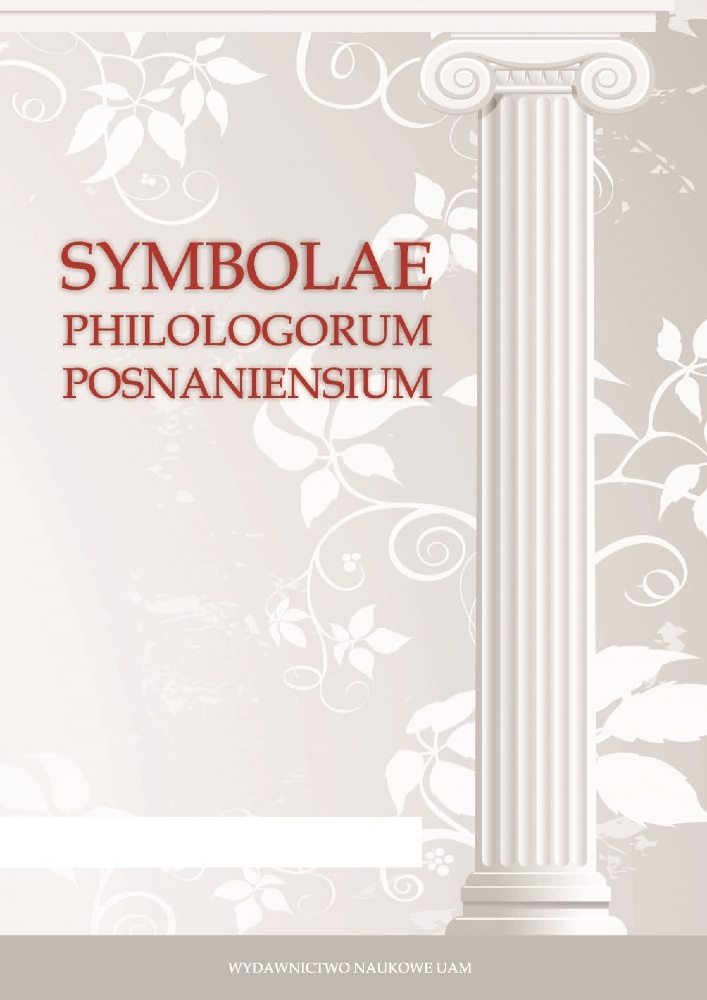Abstrakt
The paper discusses how the major plot elements of the Homeric Hymn to Hermes (inventing the lyre, stealing Apollo's cattle and especially slaughtering it) tie in together to instruct the (male) youth on their prospective roles as responsible, cultured family supporting adults, warriors and members in their community's cults. It thus highlights the educational and paedagogical aspects of the myths featured in the poem's narrative part.Bibliografia
T. W. Allen, W. R. Halliday, E. E. Sikes (eds), Homeric Hymns, Oxford 1936.
W. Appel (tekst, przekład, wstęp i opracowanie), ΥΜΝΟΙ ΟΜΗΡΙΚΟΙ, czyli hymny homeryckie, Toruń 2001.
J. N. Bremmer, Adolescents, Symposion and Pederasty, [w:] O. Murray (ed.), Sympotica: A symposium on the symposion, Oxford 1994, 135–148.
L. Bruit-Zaidman, P. Schmitt-Pantel, Religion in the Ancient Greek City, Cambridge 1947.
W. Burkert, Homo Necans. The anthropology of ancient Greek sacrificial ritual and myth, Berkeley 1983.
W. Burkert, Sacrificio-sacrilegio: Il “trickster” fondatore, “Studi Storici” 20, 1984, 835–845.
W. Burkert, Greek Religion, Oxford 2000.
J. K. Campbell, Honour, Family and Patronage, Oxford 1964.
F. Càssola (a cura di), Inni omerici, Milano 1992.
P. Chantraine, Dictionnaire étymologique de la langue Grecque. Histoire des Mots, Paris 1968.
J. Strauss Clay, The Hecate of the Theogony, “Greek, Roman and Byzantine Studies”
, 1984, 27–38.
J. Strauss Clay, The Politics of Olympus. Form and meaning in the major Homeric Hymns, Princeton 1989.
J. Strauss Clay, The Homeric Hymns, [w:] J. Morris, B. Powell (eds), A New Companion to Homer, New York 1997, 489–507.
D. Damoulin, Die Chelys: ein altgriechisches Saiteninstrument, “Archiv für Musikwissenschaft”
, 1992, 85–109.
J. Danielewicz, Morfologia hymnu antycznego, Poznań 1976.
H. Frisk, Griechisches etymologisches Wörterbuch, Heidelberg 1960.
J. F. García, Symbolic Action in the Homeric Hymns: The theme of recognition, “Classical Antiquity” 21, 2002, 5–39.
F. Graf, Prayer in Magical and Religious Ritual, [w:] Ch. A. Faraone, D. Obbink (eds),
Magika Hiera: Ancient Greek magic and religion, Oxford 1997, 188–213.
E. S. Greene, Revising Illegitimacy: The use of epithets in the “Homeric Hymn to Hermes”, “Classical Quarterly” 55, 2005, 343–349.
A. Haft, The Mercurial Significance of Raiding: Baby Hermes and animal theft in contemporary Crete, “Arion” 4, 1996, 27–48.
T. Hägg, Hermes and the Invention of the Lyre. An unorthodox version, “Symbolae Osloenses” 64, 1989, 36–73.
S. E. Harrell, Apollo’s Fraternal Threats: Language of succession and domination in the “Homeric Hymn to Hermes”, “Greek, Roman and Byzantine Studies” 32, 1992, 307–329.
M. Herzfeld, The Poetics of Manhood, Princeton 1985.
Th. K. Hubbard, The “Cooking” of Pelops: Pindar and the process of mythological revisionism, “Helios” 14, 1997, 3–21.
W. Jaeger, Paideia, Warszawa 2001.
R. Janko, Homer, Hesiod and the Hymns: Diachronic development in epic diction, Cambridge 1982.
S. Johnston, Myth, Festival and Poet: The “Homeric Hymn to Hermes” and its performative context, “Classical Philology” 97 (2), 2002, 109–132.
E. Kadletz, The Sacrifice of Eumaios the Pig Herder, “Greek, Roman and Byzantine Studies” 25, 1984, 99–105.
L. Kahn, Hermès passe: Ou, Les ambiguïtés de la communication, Paris 1978.
M. Kaimio, Music in the “Homeric Hymn to Hermes”, “Arctos” 8, 1974, 29–42.
K. Kerényi, Hermes przewodnik dusz. Mitologem źródła życia mężczyzny, Warszawa 1993.
K. Kerényi, Misteria Kabirów. Prometeusz, Warszawa 2000.
R. Kotansky, Incantations and Prayers for Salvation on Inscribed Greek Amulets, [w:] Ch. A. Faraone, D. Obbink (eds), Magika Hiera: Ancient Greek magic and religion, Oxford 1997, 188–213.
J. G. Landels, Muzyka starożytnej Grecji i Rzymu, Kraków 2003.
W. Lengauer, Religijność starożytnych Greków, Warszawa 1994.
B. Lincoln, The Indo-European Cattle-raiding Myth, “History of Religions” 16, 1976, 42–65.
B. Lincoln, Priests, Warriors and Cattle: A study in the ecology of Religions, Berkeley 1981.
M. Maas, J. McIntosh Snyder, Stringed Instruments of Ancient Greece, New Haven 1989.
M.P. Montero-Honorato, Homero y la música, “Memorias de historia antigua” 9, 1988, 195–211.
O. Murray, The Symposion as Social Organization, [w:] R. Hägg (ed.), The Greek Renaissance of the Eighth Century b.c., Stockholm 1983.
J. A. Notopoulos, The Homeric Hymns as Oral Poetry: A study of the post-Homeric Oral tradition, “American Journal of Philology” 83, 1962, 337–368.
H. Podbielski, Liryzacja epopei na podstawie analizy strukturalnej hymnu homeryckiego do Hermesa, „Meander” 18 (7–8), 1963, 321–338.
H. Podbielski, Funkcja zapożyczeń językowych i neologizmów w „Hymnie do Hermesa”, „Roczniki Humanistyczne” 14 (3), 1966, 33–47.
H. Podbielski, Hymny homeryckie, [w:] H. Podbielski (red.), Literatura Grecji starożytnej, Lublin 2005, 157–184.
W. H. Race, Aspects of Rhetoric and Form in Greek Hymns, “Greek, Roman and Byzantine Studies” 23, 1982, 5–14.
N. Richardson (eds), Three Homeric Hymns: to Apollo, Hermes and Aphrodite: Hymns 3, 4 and 5, Cambridge 2010.
S. Saïd, Les Crimes des prétendants, la maison d’Ulysse et les festins de l’Odyssée, [w:] Études de littérature ancienne, Paris 1979, 13–22.
J. Solomon, Apollo and the Lyre, [w:] J. Solomon (ed.), Apollo: Origins and influences, Tucson 1994, 37–46.
C.A.. Sowa, Traditional Themes and the Homeric Hymns, Chicago 1984.
S. Srebrny (przełożył i opracował), Ajschylos. Tragedie, Kraków 2005.
A. Świderkówna, Bogowie zeszli z Olimpu. Bóstwo i mit w greckiej literaturze świata hellenistycznego, Warszawa 1994.
J.-P. Vernant, Le mythe prométhéen chez Hésiode, [w:] Mythe et société en Grèce ancienne, Paris 1974, 177–194.
J.-P. Vernant, Źródła myśli greckiej, Gdańsk 1996.
J.-P. Vernant, Mit i religia w Grecji starożytnej, Warszawa 1998.
T.B.L. Webster, Homeric Hymns and Society, [w:] J. Bingen. G. Lambier, G. Nachtergael (eds), Le monde grec. Pensée, littérature, histoire, documents. Hommages à Claire Préaux, Bruxelles 1975, 13–22.
M.L. West, Hesiodea, „Classical Quarterly” 11, 1961, 130–145.
M.L. West. (ed.), Hesiod: Theogony, Oxford 1988.
M.L. West, The Invention of Homer, “Classical Quarterly” 49, 1999, 364–382.
M.L. West (ed.), Homeric Hymns. Homeric Apocrypha, Lives of Homer, Cambridge Mass. 2003.
M.L. West, Muzyka starożytnej Grecji, Kraków 2003.
L. Whibley, A Companion to Greek Studies, New York 1963.
E. Wirshbo, The Mekone Scene in the “Theogony”: Prometheus as prankster, “Greek, Roman and Byzantine Studies” 23, 1982, 101–110.
Licencja
